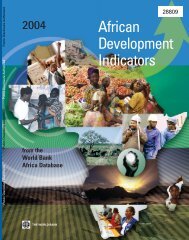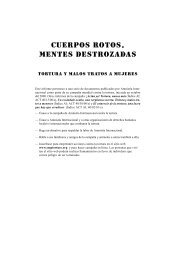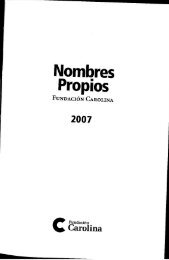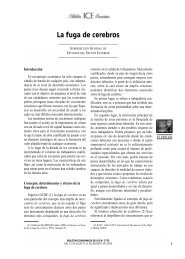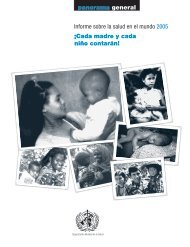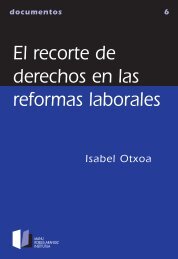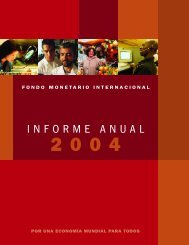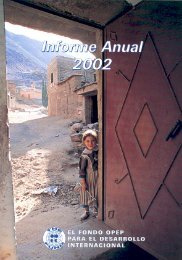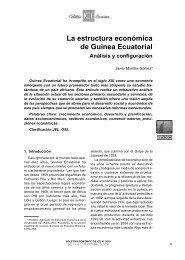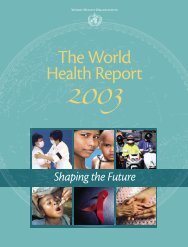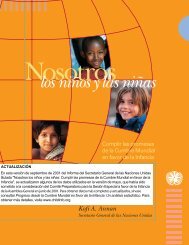Educación para todos: el imperativo de la calidad; Informe ... - eFaber
Educación para todos: el imperativo de la calidad; Informe ... - eFaber
Educación para todos: el imperativo de la calidad; Informe ... - eFaber
- No tags were found...
You also want an ePaper? Increase the reach of your titles
YUMPU automatically turns print PDFs into web optimized ePapers that Google loves.
REFERENCIAS / 441Glewwe P.; Nauman, I; y Kremer, M. 2003. Teacher incentives. Cambridge (Massachusetts, EE.UU.), Oficina Nacional<strong>de</strong> Investigación Económica (NBER) (Documento <strong>de</strong> trabajo <strong>de</strong> <strong>la</strong> NBER Nº 9.671).Gobierno <strong>de</strong> <strong>la</strong> República Unida <strong>de</strong> Tanzania. 2001. Education Sector <strong>de</strong>v<strong>el</strong>opment programme. Primary education<strong>de</strong>v<strong>el</strong>opment p<strong>la</strong>n (2002-2006). Dar Es-Sa<strong>la</strong>am, Gobierno <strong>de</strong> <strong>la</strong> República Unida <strong>de</strong> Tanzania, Comité <strong>para</strong> <strong>el</strong>Desarrollo <strong>de</strong> <strong>la</strong> Educación Básica.Gobierno <strong>de</strong> Zambia. 2004. Memorandum of Un<strong>de</strong>rstanding: Co-Ordination and Harmonisation of GRZ/DonorPractices for Aid Effectiveness in Zambia. Lusaka, Gobierno <strong>de</strong> <strong>la</strong> República <strong>de</strong> Zambia.Good, T. L.; Biddle, B. J.; y Brophy, J. E. 1983. Teaching effectiveness: research findings and policy implications.Columbia, Universidad <strong>de</strong> Missouri, Centro <strong>de</strong> Investigación d<strong>el</strong> Comportamiento Social (<strong>Informe</strong> técnico,Nº 319).Good, T. L.; y Brophy, J. E. 1986. “School effects” en M. C. Wittrock (compi<strong>la</strong>dor), Handbook of research on teaching.Nueva York, Macmil<strong>la</strong>n, págs. 328-375.Greaney, V.; Khandker, S. R.; y A<strong>la</strong>m, M. 1999. Bang<strong>la</strong><strong>de</strong>sh: assessing basic learning skills. Washington, D. C.,Banco Mundial.Green, D. A.; y Ridd<strong>el</strong>l, W. C. 2003. “Literacy and earnings: an investigation of the interaction of cognitive andunobserved skills in earnings generation”. Labour Economics, Vol. 10, págs. 165-184.Grimes, B. F. (compi<strong>la</strong>dor). 2000. Ethnologue: <strong>la</strong>nguages of the world. 14ª edición. Dal<strong>la</strong>s, SIL International(www.ethnologue.com/web.asp).Grogger, J. T.; y Ei<strong>de</strong>, E. 1993. “Changes in college skills and the rise in the college wage premium”. Journalof Human Resources, Vol. 30, Nº 2, págs. 280-310.Grupo <strong>de</strong> trabajo <strong>para</strong> <strong>la</strong> cooperación internacional en materia <strong>de</strong> <strong>de</strong>sarrollo <strong>de</strong> competencias. 2002. World Bankstudy on vocational skills <strong>de</strong>v<strong>el</strong>opment in sub-Saharan Africa. Edimurgo, Grupo <strong>de</strong> trabajo <strong>para</strong> <strong>la</strong> cooperacióninternacional en materia <strong>de</strong> <strong>de</strong>sarrollo <strong>de</strong> competencias (Actas <strong>de</strong> <strong>de</strong>bates en Documento sobre Desarrollo <strong>de</strong>Competencias, Nº 7).Guadalupe, C.; y Louzano, P. 2003. La medición <strong>de</strong> <strong>la</strong> culminación universal <strong>de</strong> <strong>la</strong> primaria en América Latina.Santiago, OREALC/UNESCO.Gund<strong>la</strong>ch, E.; Woessmann, L.; y Gm<strong>el</strong>in, J. 2001. “The <strong>de</strong>cline of schooling productivity in OECD countries”.Economic Journal, Vol. 111, Nº 471, págs. 135-147.Gupta, S.; Verhoeven, M.; y Tiongson, E. 1999. Does higher government spending buy better results in educationand health care?. Washington, D. C., Fondo Monetario Internacional (Documento <strong>de</strong> trabajo Nº 99/21).Gusso, D. 2004. Brazil report. Documento <strong>de</strong> referencia <strong>para</strong> <strong>el</strong> <strong>Informe</strong> <strong>de</strong> Seguimiento <strong>de</strong> <strong>la</strong> EPT en <strong>el</strong> Mundo2005.Hal<strong>la</strong>k, J.; y Poisson, M. 2002. Ethics and corruption in education: results from the expert workshop h<strong>el</strong>d at IIEP,París, 28-29 November 2001. París, Instituto Internacional <strong>de</strong> P<strong>la</strong>neamiento <strong>de</strong> <strong>la</strong> Educación (IIPE) <strong>de</strong> <strong>la</strong> UNESCO(Observatory Programme, Policy Forum, Nº 15).—. 2004a. Teachers’co<strong>de</strong>s of conduct: how can they h<strong>el</strong>p improve quality?. Documento <strong>de</strong> referencia <strong>para</strong> <strong>el</strong> <strong>Informe</strong><strong>de</strong> Seguimiento <strong>de</strong> <strong>la</strong> EPT en <strong>el</strong> Mundo 2005. París, Instituto Internacional <strong>de</strong> P<strong>la</strong>neamiento <strong>de</strong> <strong>la</strong> Educación(IIPE) <strong>de</strong> <strong>la</strong> UNESCO.—. 2004b. Corruption in education: what impact on quality, equity and ethics?. Documento <strong>de</strong> referencia <strong>para</strong> <strong>el</strong><strong>Informe</strong> <strong>de</strong> Seguimiento <strong>de</strong> <strong>la</strong> EPT en <strong>el</strong> Mundo 2005. París, Instituto Internacional <strong>de</strong> P<strong>la</strong>neamiento <strong>de</strong> <strong>la</strong>Educación (IIPE) <strong>de</strong> <strong>la</strong> UNESCO.Hanushek, E. A. 1995. “Interpreting recent research on schooling in <strong>de</strong>v<strong>el</strong>oping countries”. World Bank ResearchObserver, Vol. 10, Nº 2, págs. 227-246.—. 1997. “Assessing the effects of school resources on stu<strong>de</strong>nt performance: an update”. Education Evaluationand Policy Analysis, Vol. 19, Nº 2, págs. 141-164.—. 2002a. “Evi<strong>de</strong>nce, politics, and the c<strong>la</strong>ss size <strong>de</strong>bate” en L. Mish<strong>el</strong> y R. Rothstein (compi<strong>la</strong>dores), The c<strong>la</strong>ss size<strong>de</strong>bate. Washington, D. C., Economic Policy Institute, págs. 37-65.—. 2002b. “Publicly provi<strong>de</strong>d education” en A. J. Auerbach y M. F<strong>el</strong>dstein (compi<strong>la</strong>dores), Handbook of publiceconomics. Vol. 4. Oxford, Elsevier Science Ltd, págs. 2.045-2.141.—. 2003a. “The failure of input-based schooling policies”. Economic Journal, Vol. 113, Nº 485, págs. 64-98.—. 2003b. “The importance of school quality” en P. E. Peterson (compi<strong>la</strong>dor), Our schools and our future:are we still at risk?. Stanford, Hoover Institution Press, págs. 141-173.—. 2004. Economic analysis of school quality. Documento <strong>de</strong> referencia <strong>para</strong> <strong>el</strong> <strong>Informe</strong> <strong>de</strong> Seguimiento d<strong>el</strong>a EPT en <strong>el</strong> Mundo 2005.



